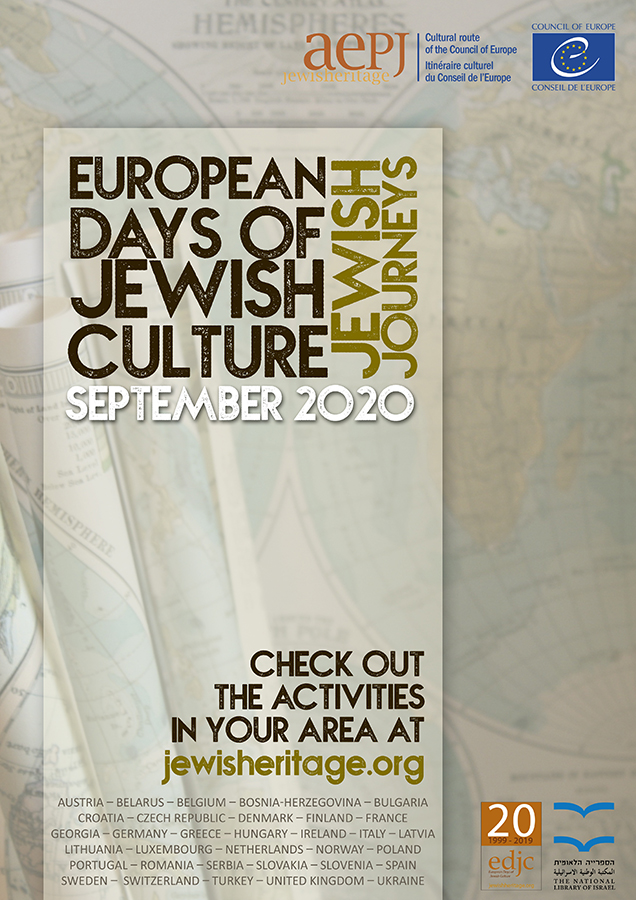European Days of Jewish Culture 2020: Jewish Journeys
Date: Sunday September 6th, 2020. However, in several countries events and activities are being planned before and after this date.
Select the country you are interested in from the drop-down menu above to see the details of the different activities.
The Online Kickoff
The AEPJ has promoted, together with the network of participating institutions, an edition that will be based on new technologies and the digital world, giving the opportunity to reach a wider audience worldwide. In this way, for the first time in 20 years, on the opening day of the Festival, an eight-hour online program will be held, open to the entire public, where conferences, interviews, concerts and videos on European Jewish heritage will take place, offering a unique look, from the inside, at the history and Jewish communities of a large number of European participating countries. We will connect live with Luxembourg, Barcelona, Jerusalem, Paris and Oxford.
The broadcast will have five main events, detailed below, in which viewers will be able to interact with the speakers through the chat. During the rest of the broadcast, various documentaries and videos produced by the participating institutions will be retransmitted. The Online Kickoff will be broadcast live on the AEPJ's profiles on Facebook, YouTube and Instagram. We invite you to connect during the day and invite your community to do the same.
Information for national coordinators and participating institutions
Report on the EDJC2020
As every year, we will soon prepare a document that will report on all the activities and results of our festival, placing great emphasis on making visible all the institutions that are part of it and that in one way or another organise an activity for the EDJC.
In order to be able to prepare this report and for you to have an outstanding presence, we would be delighted if you could fill in the following form, which should not take you more than 10 minutes to complete. In addition, thanks to your feedback we will be able to evaluate our work as coordinators and improve it for the coming years.
Fill in the feedback form at the following link::

Journeys are a big part of the Jewish story. Since the Exile from the Land of Israel in AD70, Jews have moved through and lived in different lands in search of religious tolerance and economic opportunity.
Arrivals in different parts of Europe led to the creation of the two main cultural and ethnic strands of the Jewish people: Muslim Spain (Sepharad) and the Rhineland (Ashkenaz) emerged as leading Jewish centers in the tenth century. Even as the Jewish communities flourished, persecution, invasions and inquisitions led to more departures and new beginnings.
Merchants and traders have also moved between cultures and acted as conduit and connector between different communities. Cities that were centers for trade and commerce have a rich and diverse Jewish heritage (Venice, Livorno, Amsterdam, Constantinople, Salonika) as different communities came together with a common goal.
Pilgrimages to the Land of Israel and later, the State of Israel, is another journey taken by Jews – from individuals and groups who made their way to Israel in the Middle Ages to the immigration to the Land of Israel in the aftermath of World War II in the face of the British Mandate’s immigration restrictions. The movement of Jews after the breakdown of the Soviet Union once again changed the Jewish map in Europe and transformed the population of Israel.
Jewish life and the culture of the communities where they found shelter came together in a sort of fusion as the Jews adapted to and adopted local customs creating a constantly evolving and enriched mosaic of Jewish customs, traditions and languages (See the NLI’s 2016 Jewish Languages exhibition).
In addition to journeys taken due to persecution or religious intolerance, throughout the centuries, Jews have also journeyed to pay homage to religious leaders. Jewish journeys can also be viewed in the spiritual sense – the rise of different movements within the faith - Sabbataism, Hassidism, Secularism - have influenced Jewish communities and the way they interact and coexist. There are religious practices relating to journeys including prayers recited as journeys are begun, and blessings after safe arrivals. Additionally, journeying and carrying luggage are prohibited on the Sabbath and holy days. For people who need to be away from home over these days, 'travelling' versions of ritual books and objects are created. Hospitality towards travelers arriving in a strange place is a basic tenet of Jewish communal life.
Another type of more personal journeys, are journeys of discovery as people who had to deny their Jewish identity or had their past hidden from them, reveal their Jewish identity later in life and explore their individual Jewish heritage.
For any question, please contact the EDJC team at edjc@jewisheritage.org



